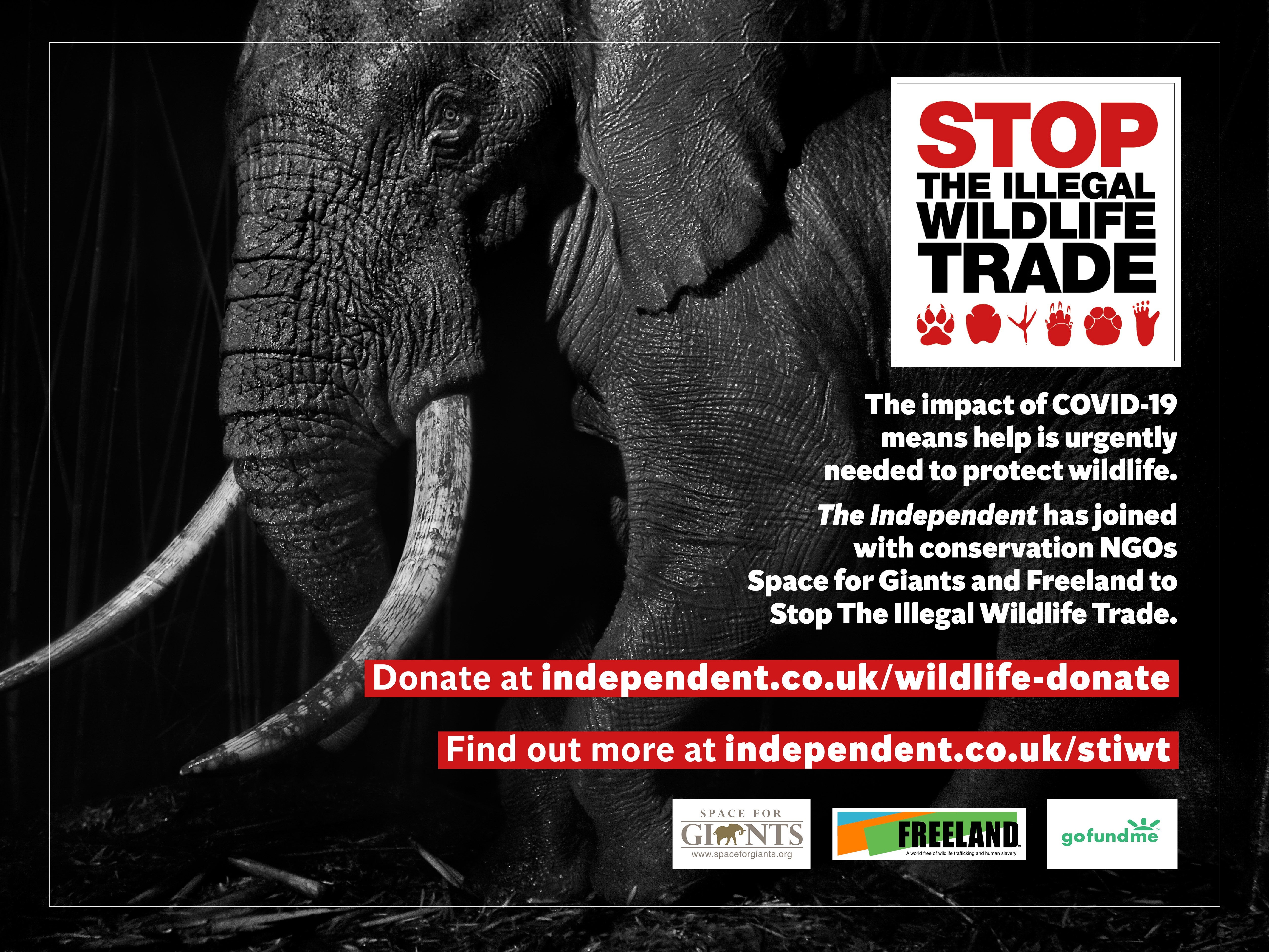Wuhan is our wake-up call, we must stop the commercial trade in wild animals to prevent further pandemics
It’s frustrating to watch world leaders focus on vaccines and trillion-dollar recovery packages but not on the root causes of Covid-19


The Independent’s Stop the Illegal Wildlife Trade campaign illuminates a criminal underworld that’s as dirty and dangerous as it gets. The slaughter, corruption, and profits of wildlife crime are staggering even to the most experienced law enforcement organisations. The cast of characters driving this multi-billion dollar business are straight out of a Bond movie. But this thriller is darker and real. Unfortunately, the villains in this story are winning.
We are experiencing the fastest rate of species loss ever. Climate change and habitat loss are important factors, but the number one driver of wildlife’s horrific decline is commercial trade.
That traffickers are driving rhinos, tigers, elephants, lions and other iconic animals toward the brink of extinction is not just sad, it spells grave danger for our own survival as well.
Stop The Illegal Wildlife Trade
We are working with conservation charities Space for Giants and Freeland to protect wildlife at risk from poachers due to the conservation funding crisis caused by Covid-19. Help is desperately needed to support wildlife rangers, local communities and law enforcement personnel to prevent wildlife crime. Donate to help Stop the Illegal Wildlife Trade HERE
Profits from the trade empower cold-hearted syndicates like the one featured in Abbianca Makoni’s feature on rhino trade. My team and I spent 20 years pursuing this global criminal organisation across four continents. Its sinister network consists of former military and police officers, drug traffickers, animal experts, and corporate accountants who know how to cook the books.
This syndicate’s reach extends between China, Vietnam, Laos, Thailand and Malaysia, into Mozambique, South Africa, and through Australia, Taiwan, Hong Kong, and the United States. They outflank enforcement officers by buying them. They purchase rhino horn and ivory from corrupt consulate officers. They own captive wildlife breeding facilities in at least 4 countries that act as laundering mechanisms for smuggled animals. They pay well and on time, which is much more than their counterpart conservation community can say.
These gangs target not only rare and endangered species, but vulnerable people as well. For example, one of them coerced young female sex-trafficked victims to smuggle rhino horns and lion bones from South Africa to Thailand, following criminal “pseudo safari hunts” where they were forced to sign export permits saying they were the hunters and importers. These young women were also forced into performing sex acts on the hunters. When we interviewed the victims in South Africa, they cried not only about what happened to them, but also for the rhinos they witnessed being killed.

If you’re picturing hooded gangs that intimidate through brute force, think again. These are professional crooks operating under legal cover, corrupting and weakening security agencies along the way. When police, prosecutors, diplomats, and even baggage handlers go onto the lucrative payroll of rhino and tiger Kingpins and Queenpins, they undermine civil society.
But most concerning is the direct threat these syndicates pose to our health and security.
The WHO’s recent investigation into the origins of Covid-19 point the finger away from Wuhan’s labs and toward wildlife supply chains.
In January 2020, I called Wuhan a “wake-up call”, pointing out that Covid-19, like other zoonotic outbreaks, result from people messing with Mother Nature. Since then, 70 like-minded groups have joined us, forming a global campaign called “EndPandemics”. We are trying to wake the world up to the root causes of zoonotic outbreaks so that we don’t go through this mess again. It’s been frustrating to watch world leaders focus on vaccines, trillion dollar recovery packages, and some on the theory that the virus was leaked from a laboratory. But not on the root causes of pandemics.
WHO has dismissed the leaked-from-a-lab theory, and are now eyeing Chinese wildlife farms and supply chains from Southeast Asia. Virus investigations often take years to find the culprit.
But we don’t need to wait for lengthy research results to act. Imagine a group of inspectors going into a fuel depot that blew up, looking for clues, discovering cigarette butts on the ground. They could take forever to determine which cigarette – or other factor—caused the explosion. But you can be sure that as the depot was rebuilt and reopened, the no-smoking regulation would be strictly enforced. We need to rebuild our world with similar precautions. Covid-19 was a bomb. We already know the triggers.
The two biggest drivers of zoonotic outbreaks are destruction of wild animal habitat and commercial trade in wild animals. These actions push and pull wild animals out of their homes and into unnaturally close contact with people and domesticated animals, where they shed viruses that can sicken or kill us. The risk grows in factory farms and crowded urban centres.
All wild animals are majestic and play critically important roles in our ecosystems. Leave them alone and we’re fine. Steal them or destroy their homes, and they become potential sticks of dynamite.
Lets end pandemics by ending commercial trade in wild animals and protecting nature — as if our lives and economies depend on it.
Steve Galster is Founder of Freeland and co-chair of EndPandemics.
Join our commenting forum
Join thought-provoking conversations, follow other Independent readers and see their replies
Comments



Bookmark popover
Removed from bookmarks